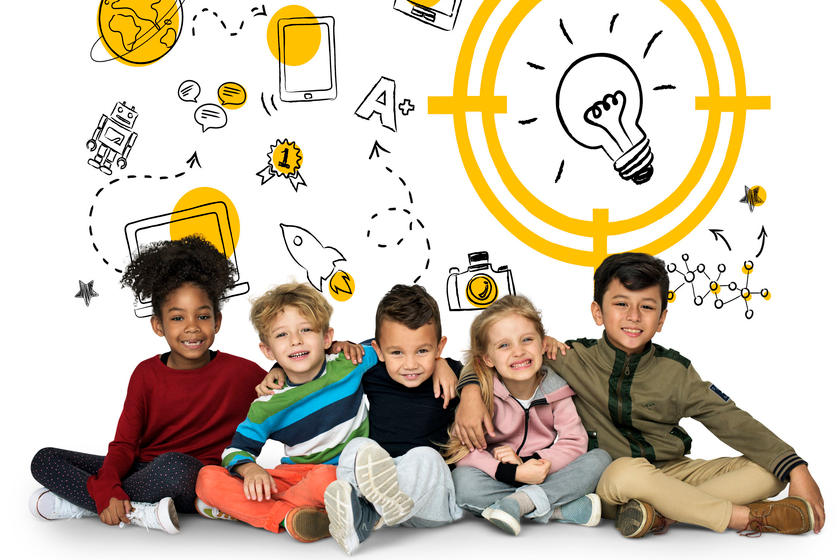
Social skills are an issue for most kids these days, not just those diagnosed with social anxiety, autism, learning disabilities or ADHD. As you may have guessed, some aspects of our modern lives—electronic devices, the frenetic pace of life and changes in socialization—greatly contribute to the social skills deficits we are seeing in children today. So how do we prevent, recognize and assist deficits in kids? To help us out with this complex issue, we interviewed an expert, Carol Miller, who is a licensed clinical social worker and the Director of Social Bridges®, a company that develops interactive social skills curricula for children and adults.
Why are Social Skills an Issue for Most Kids Today?
This may be a trite answer, but society is different today. “Back in the day”, neighborhood kids spent a lot of time playing together with little or no adult supervision. They routinely made up games, established rules and solved problems—effectively practicing their social skills. Today, the opportunities for this kind of practice have diminished exponentially. The quantity and quality of unstructured play time has faded over time. When they do have downtime, kids interact with their devices, not other kids.
Additionally, parents’ modeling behaviors have a huge impact on kids in two ways: how they socialize WITH their kids and how they socialize AROUND their kids. Parents work so hard and the pace of life is so fast that they don’t socialize with their kids as much as they used to. In the car, the kids’ noses are in their smartphones and at home, parents’ minds are preoccupied with work, dinner and school forms. When parents attend a field trip or birthday party, it is THEIR turn to be tuned out, whether their attention is being directed to their own smartphones or other parents—or both! Before life became a series of multi-tasking and electronic devices, parents spent much more time involved with children, automatically modeling and coaching social skills along the way. It’s the sort of thing we took for granted, until we noticed the repercussions of its absence.
Diagnoses such as generalized anxiety disorder, learning disabilities and autism often present with comorbid conditions such as social skills deficits; however, even though neurotypical kids may have more capacity to learn social skills, they present similar behaviors.
How Do You Know if Your Child is Struggling?
Some of us are naturally more social, but we all need social skills! There are different signs depending on a child’s age that may give you clues to social skills issues. In preschool or elementary school, you may get that note from the teacher that your child is disrupting class. As with many other issues like ADD / ADHD, anxiety and learning disabilities, quieter kids’ symptoms may go unnoticed for a time, until their difficulties become more apparent as they mature. Younger children who suffer from underdeveloped social skills may not be invited to parties, or don’t join in when they go to parties. They may not eat lunch with other children or exhibit other isolating behaviors. They may become noticeably stressed in social situations, causing parents to leave gatherings earlier than planned.
Middle school children become more social as they progress to their teen years. Normally they will reach out to each other on the phone and begin to make plans. A child with a strong refusal to join clubs or choose activities in which to participate may be suffering from social skills deficits.
Kids with learning disabilities and social anxiety may exhibit the same behaviors when it comes to responding inappropriately in social situations, but for different reasons. Children with learning disabilities and ADHD are not wired to focus and catch social cues whereas children with social anxiety may be so worried about how others perceive them that they are not focusing or giving eye contact, leading to social missteps.
The bottom line is: we all need to learn social skills to thrive in life, so if a child is not learning them, social signals and responses must be intentionally taught.
Why and How are Social Skills Taught?
If you’re playing a board game, there are printed rules. Social norms are really social rules, but they aren’t written anywhere. When you are aware of the rules (and changes in the rules as you get older), you have social cognition; navigating social situations doesn’t seem especially hard. But when you have social skills deficits or a diagnosis that affects social skills, your level of social confidence erodes. It’s like being in a foreign country—you’d make all sorts of social missteps and be largely unaware of what you did wrong. It’s like trying to play a game of Monopoly without knowing the rules. Those affected by social skills deficits become frustrated and often cope by either acting out or shutting down.
Social skills can be taught to children and adults. The methods used depend on the age of the person, but two rules are always followed: 1) Teaching must be done directly; if the person could have picked it up on his own, he would have. With young children we tend to automatically coach social skills, but as kids get older, we tend to assume they learned them already. This is faulty thinking. 2) Teaching must include practice; social skills are not attained by discussion alone.
For example, we take it for granted that people know how to navigate a trip to the movies, but those with social skills deficits may find the process confounding. First, we’d “pre-teach” the experience, so they know what to expect, from arriving at the theatre, to purchasing tickets, to waiting in line for the ticket-taker, etc. Depending on the age of the person, this may be a story, role play or chat. After the actual experience, it’s important to review how it went so that the person can reinforce her learning.
Can Parents Help Improve Deficits?
Not only can parents help improve social skills—they must! Today, emotional IQ is just as important as intellectual IQ. For example, to recruit a well-rounded student body, colleges look at both the scholastic performance of applicants and their social involvement.
Parents tend to focus on helping their children with academics. They understand kids might need extra coaching on spelling or math, but they don’t even think about social/emotional learning! Of course, academics are important; parents just need to keep in mind to ask about the spelling test AND who their child ate lunch with that day!
Even if a child is taking medications or receiving neurofeedback therapy, social skills tools can help. As explained previously, intentional instruction and practice is necessary for a child to overcome social skills deficits. Social skills are some of the foundational building blocks of a healthy and successful life. The topic is complex and can be overwhelming. If you think your child needs help, there are professionals who can lend a hand. Ask us!
Special thanks to Ms. Miller for providing her expertise for this article.
Image Copyright: rawpixel / 123RF Stock Photo





